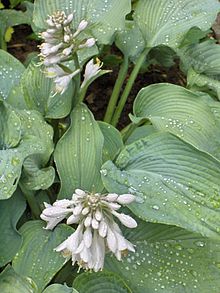
Back هسته Arabic هوستا ARZ Hosta Byelorussian Hosta Catalan Hosta (tanom nga asparagos) CEB Bohyška Czech Hosta Danish Funkien German Hosta Spanish Hosta Estonian
| Hosta | |
|---|---|

| |
| 'Bressingham Blue', a Hosta cultivar | |
| Scientific classification | |
| Kingdom: | Plantae |
| Clade: | Tracheophytes |
| Clade: | Angiosperms |
| Clade: | Monocots |
| Order: | Asparagales |
| Family: | Asparagaceae |
| Subfamily: | Agavoideae |
| Genus: | Hosta Tratt., conserved name, not Jacq. (syn of Cornutia in Lamiaceae) nor Vell. ex Pfeiff. (Primulaceae)[1] |
| Synonyms[2] | |
| |

Hosta (/ˈhɒstə/,[5] syn. Funkia) is a genus of plants commonly known as hostas, plantain lilies and occasionally by the Japanese name gibōshi. Hostas are widely cultivated as shade-tolerant foliage plants. The genus is currently placed in the family Asparagaceae, subfamily Agavoideae,[6] and is native to northeast Asia (China, Japan, Korea, and the Russian Far East).[2] Like many "lilioid monocots", the genus was once classified in the Liliaceae. The genus was named by Austrian botanist Leopold Trattinnick in 1812,[7] in honor of the Austrian botanist Nicholas Thomas Host.[8] In 1817, the generic name Funkia was used by German botanist Kurt Sprengel in honor of Heinrich Christian Funck, a collector of ferns and alpines;[9] this was later used as a common name and can be found in some older literature.
- ^ Tropicos, search for Hosta
- ^ a b Cite error: The named reference
hwas invoked but never defined (see the help page). - ^ "Tropicos – Name Search".
- ^ Tropicos, search for Libertia
- ^ Sunset Western Garden Book, 1995:606–607
- ^ Stevens, P.F., Angiosperm Phylogeny Website: Asparagales: Agavoideae
- ^ Diana Wells 100 Flowers and How They Got Their Names, p. 96, at Google Books
- ^ Mikolajski, A. (1997). Hostas – The New Plant Library, Canada: Lorenz Books. ISBN 1-85967-388-0
- ^ "Hostas – taxonomy". hostas.fr. Archived from the original on 4 March 2016. Retrieved 24 March 2015.